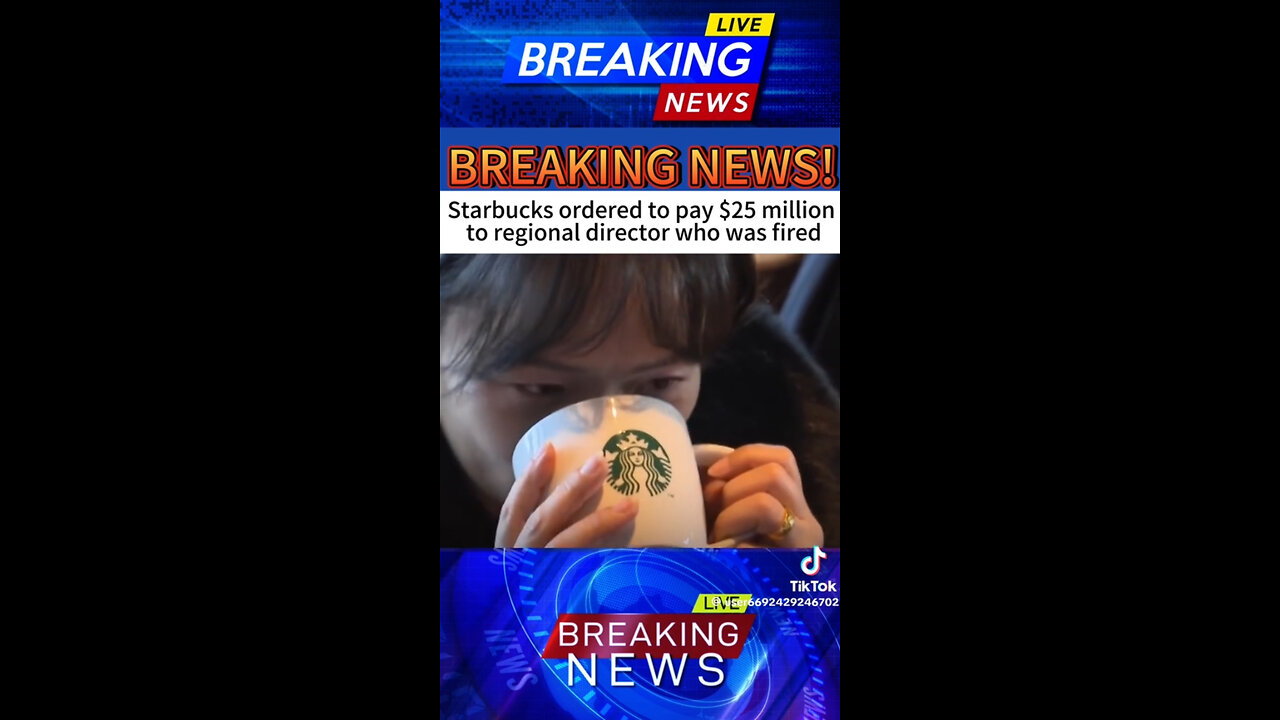Premium Only Content

Major Verdict: Starbucks Ordered to Pay $25.6 Million in Racial Discrimination Case
In a landmark decision, a New Jersey jury awarded $25.6 million to Shannon Phillips, a former regional manager for Starbucks, who alleged that the coffee giant fired her based on her race. The unanimous verdict has sparked widespread debate, highlighting the complexities of race and accountability in corporate America.
The Incident that Sparked a Controversy
The case traces its roots to a viral incident in 2018 at a Philadelphia Starbucks, where two Black men were arrested while waiting for a business associate. The event, widely condemned as racial profiling, ignited a national conversation about race and bias in public spaces. Although Shannon Phillips was not present during the arrests, her firing followed shortly thereafter.
Phillips’s Claims of Discrimination
Phillips, who oversaw several Starbucks locations in the region, argued that she was terminated unjustly because she is white. According to her lawsuit:
• Starbucks used her as a scapegoat to demonstrate a commitment to racial sensitivity amid public backlash.
• Her termination was not based on her job performance or any direct involvement in the Philadelphia incident.
A critical element of her case involved testimony from a Black district manager who alleged that race played a role in both Phillips’s firing and his own retention. He claimed that while Phillips was terminated, he remained employed despite his closer proximity to the incident.
Starbucks’s Defense
Starbucks maintained that Phillips’s firing was based on legitimate, non-discriminatory reasons. According to court documents:
• The company alleged that Phillips appeared “overwhelmed, frozen, and lacked awareness” in handling the fallout from the incident.
• Starbucks stated that the decision to terminate Phillips was unrelated to her race and was instead driven by her perceived inability to manage the crisis effectively.
Despite these arguments, the jury ultimately sided with Phillips, finding her claims of racial discrimination compelling.
The Verdict
After deliberating, the jury awarded Phillips:
• $600,000 in compensatory damages for emotional distress and reputational harm.
• $25 million in punitive damages, sending a strong message about the consequences of perceived racial discrimination in the workplace.
This substantial financial award underscores the jury’s belief that Phillips’s termination was unjust and racially motivated.
Corporate America’s Reckoning with Race and Accountability
This case raises critical questions about how companies address issues of race and bias, particularly in the aftermath of high-profile incidents:
1. Balancing Accountability and Fairness
The jury’s decision suggests that efforts to address racial sensitivity must not come at the expense of fairness and non-discriminatory treatment for all employees. In trying to mitigate public outrage, companies risk creating new inequities.
2. The Challenge of Public Backlash
For Starbucks, the 2018 arrests represented a reputational crisis. The company responded by implementing anti-bias training across its stores, an unprecedented move at the time. However, the Phillips case illustrates how internal actions taken during public crises can lead to unintended consequences, including allegations of reverse discrimination.
3. Legal and Ethical Implications
This verdict highlights the legal risks companies face when making high-stakes decisions under public scrutiny. Employers must ensure that their actions are consistent with anti-discrimination laws, regardless of the pressures they face.
Public Reaction
The Phillips verdict has elicited a range of reactions:
• Supporters argue that the decision highlights the importance of protecting all employees from discrimination, regardless of race.
• Critics worry that the ruling could undermine efforts to address systemic racism, potentially discouraging companies from taking decisive actions in the future.
Starbucks’s Response
When approached for comment, Starbucks declined to issue a statement on the verdict. The company’s silence leaves open questions about how it plans to address the legal and reputational fallout from the case.
Conclusion
The $25.6 million verdict against Starbucks is more than a legal ruling—it’s a touchstone in the ongoing conversation about race, accountability, and fairness in the workplace. As companies navigate these complex dynamics, this case serves as a reminder that efforts to address bias must be handled with care, ensuring that no one is unfairly targeted or sacrificed in the process. For Starbucks, the ruling is not just a financial setback but an invitation to reflect on its internal policies and the broader implications of its actions during times of crisis.
-
 1:27:21
1:27:21
FragmentsOfTruth
11 days ago🜏 FRACTAL IMMORTALITY
2801 -
 LIVE
LIVE
Matt Kohrs
10 hours agoHUGE Earnings Beat, Inflation Data & New Record Highs || Live Trading Options & Futures
684 watching -
 19:44
19:44
Bearing
2 hours agoWorld’s CRAZIEST Feminist Wants AMERICANS to WAKE THE F*** UP 🦅💥
44117 -
 LIVE
LIVE
Randi Hipper
22 minutes agoUNITED STATES BITCOIN RESERVE IS COMING! WHITE HOUSE CRYPTO REPORT EXPLAINED
73 watching -
 LIVE
LIVE
Wendy Bell Radio
6 hours agoBurn Baby Burn
7,785 watching -
 LIVE
LIVE
JuicyJohns
1 hour ago $0.63 earned🟢#1 REBIRTH PLAYER 10.2+ KD🟢$500 GIVEAWAY SATURDAY!
153 watching -
 LIVE
LIVE
LFA TV
12 hours agoLFA TV ALL DAY STREAM - THURSDAY 7/31/25
4,497 watching -
 1:02:45
1:02:45
Game On!
18 hours ago $2.56 earnedFootball is BACK! NFL Hall of Fame Game 2025
17.3K2 -
 1:55:56
1:55:56
FusedAegisTV
23 hours ago3rd Party Partner Showcase Nintendo Direct! REACTION 7.31.2025 | FusedAegis Presents
13.2K -
 13:30
13:30
WhaddoYouMeme
18 hours ago $3.66 earnedIt All Makes Sense Now
20.5K24